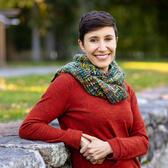Justice, Community, and Adrienne Rich
April is National Poetry Month, and over the past few days I’ve been re-reading some poems by my favorite poet, Adrienne Rich. There’s so much that I love about Rich and her writing. I love how powerfully—and radically—she fuses political commitment and the pursuit of justice into her poetic vision. She writes provocatively on sexuality, race, language, power, and women’s culture as she combats racism, militarism, homophobia, and anti-Semitism. She is determined “to write directly and overtly as a woman, out of a woman’s body and experience” expressing that the “will to change begins in the body, not in the mind.”
During my senior year of college, I heard Rich speak and was struck by how gentle and calm she seemed; how incredibly humble and accessible. I was moved most by what she shared of her poem, “Yom Kippur, 1984” in which she meditates on the tension between a longing for community and a desire for solitude and independence. She writes:
But I have a nightmare to tell: I am trying to say
that to be with my people is my dearest wish
but that I also love strangers
that I crave separateness
There is a lot in this passage that resonates with me personally, and upon re-reading it just last night, it got me thinking more about Jewish women and the Jewish community at large. Historically, it is the separateness and exclusion from community, from narratives, from liturgy, and from ritual life that have made many women feel like strangers in their own communities. And yet, it’s interesting how that separateness has, at times, allowed women to come together to create something new. “Yom Kippur, 1984” also makes me think more about expressions of solidarity (or lack thereof) with the Jewish community in times of political struggle. How can I criticize the Jewish community or stand apart from the community in support of others without feeling like my loyalty to the Jewish community is threatened? This is challenging, as Rich expresses in much of her writing.
With nineteen volumes of poetry, three collections of essays -- On Lies, Secrets and Silence (1979), Blood, Bread and Poetry (1986), and What Is Found There: Notebooks on Poetry and Politics (1993), her ground-breaking study of motherhood, Of Woman Born: Motherhood as Experience and Institution (1976), the editing of influential lesbian-feminist journals, and a lifetime of activism and visibility, Rich has won nearly every prestigious literary award, the Fund for Human Dignity Award of the National Gay Task Force, two Guggenheim Fellowships, and the William Whitehead Award for Lifetime Achievement. And yet, these awards have not quieted her response to the injustices around her. If anything, they have made her all the more uncompromising in her ethical and moral commitments. In 1974, her collection Diving Into the Wreck received the National Book Award for Poetry, but Rich refused the award individually, and instead joined with two of the other nominees, Audre Lorde and Alice Walker, to accept it in the name of all women who are silenced. And In 1997, she created a stir when she refused the National Medal for the Arts awarded by the White House administration because of the “inconsistencies” between art and its “cynical politics.” In her statement of refusal, she wrote:
“There is no simple formula for the relationship of art to justice. But I do know that art… means nothing if it simply decorates the dinner table of power that holds it hostage. The radical disparities of wealth and power in America are widening at a devastating rate. A president cannot meaningfully honor certain artists while the people at large are so dishonored.”
For me, Adrienne Rich’s unshakable convictions and her radical commitment to social justice are deeply inspiring. And as I type this from my office at the Jewish Women’s Archive, I realize that Rich really captures what JWA is and does:
“Whatever is unnamed, undepicted in images, whatever is omitted from biography, censored in collections of letters, whatever is misnamed as something else, made difficult-to-come-by, whatever is buried in the memory by the collapse of meaning under an inadequate or lying language -- this will become, not merely unspoken, but unspeakable.”
For more about Adrienne Rich, check out JWA's "This Week in History"







M
Marge Piercy's writings, including her poetry, merit a current essay.
speaking of convictions and radical social statements, i think Deena Metzger would be good company.
You might also really like Louise GlÌÄå_ck.